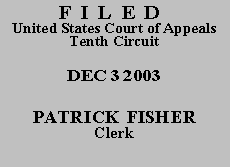

| JAMES KASTER,
Plaintiff-Appellant, v. SAFECO INSURANCE COMPANY OF AMERICA, Defendant-Appellee. |
|
Plaintiff seeks review of the district court's order granting defendant's motion for summary judgment. See Kaster v. Safeco Ins. Co. of Am., 212 F. Supp. 2d 1264, 1279 (D. Kan. 2002). We have jurisdiction under 28 U.S.C. § 1291, and we affirm. We review the district court's decision de novo, employing the same standard as the district court. Amro v. Boeing Co., 232 F.3d 790, 796 (10th Cir. 2000). Summary judgment is appropriate if no genuine issue as to any material fact is in dispute and the moving party is entitled to judgment as a matter of law. Fed. R. Civ. P. 56(c).
Plaintiff sued his former employer, Safeco, for employment discrimination in violation of the Age Discrimination in Employment Act, 29 U.S.C. §§ 621-34. He contends that Safeco failed to promote or transfer him to an open position after Safeco acquired plaintiff's previous employer, American Insurance Co. of America. Ultimately, Safeco closed the office at which plaintiff worked and terminated his employment.
In an age-discrimination action, the court follows the familiar burden-shifting requirements of McDonnell Douglas Corp. v. Green, 411 U.S. 792 (1973). Under this framework, a plaintiff must first establish a prima facie case of discrimination. Id. at 802. Once plaintiff does so, the defendant must provide nondiscriminatory reasons for its actions. See Anaeme v. Diagnostek, Inc., 164 F.3d 1275, 1279 (10th Cir. 1999). At that stage, plaintiff may resist summary judgment only if he can present evidence that the defendant's reasons are pretextual (unworthy of belief) or can introduce evidence of discriminatory motive. Danville v. Reg'l Lab. Corp., 292 F.3d 1246, 1250 (10th Cir. 2002). "Pretext can be shown by such weaknesses, implausibilities, inconsistencies, incoherencies, or contradictions in the employer's proffered legitimate reasons for its action that a reasonable factfinder could rationally find them unworthy of credence and hence infer that the employer did not act for the asserted non-discriminatory reasons." Id. (quoting Morgan v. Hilti, Inc., 108 F.3d 1319, 1323 (10th Cir. 1997) (internal quotation omitted)). In evaluating his showing of pretext, the Court considers the evidence as a whole. Id.
Plaintiff alleges that he was not promoted (1) to any of Safeco's thirteen Regional Personal Business Manager (PBM) positions in 1997, (2) to any of three later PBM positions in 1998 and 1999, or (3) to an administrative services manager position in 1999. He further contends that Safeco failed to place him in any available position, although he does not specify a particular position he claims should have been his. Plaintiff also challenges Safeco's failure to transfer him to any Territory Manager position (again without naming a specific position), even though transfer to Territory Manager would have been a demotion. Finally, plaintiff claims Safeco terminated him on the basis of his age.
The district court fully considered all of plaintiff's arguments. The court found that claims regarding promotion and selection decisions prior to November of 1998 were time-barred because plaintiff failed to file timely an administrative charge with the EEOC. Kaster, 212 F. Supp. 2d at 1268-69. The court further determined that plaintiff was not entitled to an additional period of time under the doctrine of equitable tolling because there was no evidence that any of Safeco's actions were intended to delay plaintiff's filing of a discrimination charge. Id. at 1269-70.
The district court held that plaintiff had failed to establish a prima facie case of discrimination based on Safeco's failure to transfer him to an unidentified "available" position or to a Territory Manager position. Id. at 1271-73. The court assumed without deciding, however, that plaintiff had established a prima facie case of discrimination with respect to three specific post-November 1998 selection decisions. Id. at 1271. Considering Safeco's reasons for the persons selected, the court determined Safeco had provided nondiscriminatory reasons for those selections. Id. at 1273. The district court then determined that plaintiff had failed to demonstrate that the reasons offered by Safeco for its decisions were pretextual, i.e., unworthy of belief. Id. at 1274-78.
With regard to plaintiff's final contention, that Safeco terminated his employment based on his age, the district court found this claim duplicative of the earlier failure to transfer/failure to promote claims because plaintiff acknowledged that the closing of the office where he worked was a legitimate business decision, not an effort to eliminate plaintiff's job or the jobs of older workers. Thus, the court concluded plaintiff had failed to present evidence sufficient for a reasonable jury to conclude Safeco's employment decisions were age-related. Id. at 1279.
On appeal, plaintiff raises the same arguments considered and decided by the district court. Upon review of the district court's thorough and careful consideration of the issues, we are in agreement with that court's holdings. Accordingly, the judgment of the district court is AFFIRMED for substantially the same reasons stated by the district court. Safeco's motion to dismiss the appeal is denied.
Entered for the Court
Circuit Judge
*. This order and judgment is not binding precedent, except under the doctrines of law of the case, res judicata, and collateral estoppel. The court generally disfavors the citation of orders and judgments; nevertheless, an order and judgment may be cited under the terms and conditions of 10th Cir. R. 36.3.